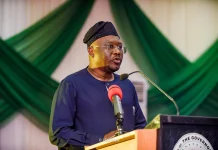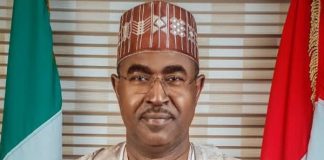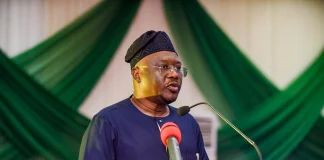🌿 Ruzu Non-Alcoholic Herbal Bitters
Ruzu Non-Alcoholic Herbal Bitters is a natural health supplement specially formulated to:
- ✅ Promote general wellness
- ✅ Detoxify the body
- ✅ Support the treatment of various ailments
Made from a powerful blend of 100% organic and medicinal herbs, Ruzu is completely alcohol-free, making it ideal for:
- 👪 All age groups
- 🌱 Health-conscious individuals
- 🌿 Anyone seeking non-alcoholic herbal remedies
Whether you're looking to boost your vitality, cleanse your system, or support healing the natural way, Ruzu Bitters offers a trusted herbal solution.
A joint committee of the Nigerian Senate and the House of Representatives has suggested that the country be divided into six more states.
Following a two-day retreat in Lagos, which was co-chaired by Deputy Speaker of the House of Representatives Benjamin Kalu and Deputy President of the Senate Barau Jibrin, the legislators came to the resolution.
The committee unanimously decided to create six more states in the nation after reviewing 55 requests.
During the retreat, they reviewed 278 requests for the creation of local governments, two boundary revisions, 55 state creation requests, and 69 laws.
As a result, the number of states in the nation would rise from 36 to 42 if the plan is implemented.
According to the resolution, each of the six geopolitical zones—North West, North East, North Central, South West, South South, and South East—would see the establishment of one new state.
South West seven, South East six, North West eight, North East seven, and North Central seven will now make up South South.
With the Federal Capital Territory (FCT), Abuja, recognized as a state, the North Central may also boast seven states. Benue, Kogi, Kwara, Nasarawa, Niger, and the Plateau are all added.
Adamawa, Bauchi, Borno, Gombe, Taraba, and Yobe are the six states of the northeast.
There are currently seven states in the Northwest: Jigawa, Kaduna, Kano, Katsina, Kebbi, Sokoto, and Zamfara.
With just five states—Abia, Anambra, Ebonyi, Enugu, and Imo—the South East clearly lacks one.
The six states of South South are the identical as those of South West: Akwa Ibom, Bayelsa, Cross River, Delta, Edo, and Rivers.
The South East, which felt marginalized in that way, made the loudest complaint during the discussion on state creation, which focused on balancing the numbers.
The South East needed a single state to establish justice and equity, according to regional stakeholders and other well-meaning Nigerians.
But according to the joint committee’s plan, a region would have eight states, others would have seven, while the South East would only have six.
The recommendation has drawn criticism from some political players in the area, who claim that it will increase inequality.
Speaking about the development, Dr. Chike Obidigbo, an elder statesman, expressed greater concern over what he called “the needless rancour over an additional state for the South East.”
Obidigbo said that there is no need for the ongoing disputes about where the new state for South East should be divided.
He emphasized that there was a clandestine attempt to sow discord among Igbo and expressed regret for the political ploys used in the attempt to solve South East’s structural marginalization.
He pointed out that leaders of the Igbo nation under the aegis of the Ohanaeze Ndigbo should call a meeting to carefully consider the various demands in order to reach a peaceful conclusion, rather than inflaming the political climate with conflicting agitations for the additional state.
One of the first known calls for the establishment of a state is adada.
However, we have heard the benefits of dividing the current five states in the South East into homogeneous communities in order to create an Etiti State.
“I think Anioma should be recognized as a separate state when the suggested one state from each of the six geopolitical zones is taken into consideration if Etiti State is given preferential consideration.
“I am forced to adopt this stance since, in contrast to the military administrations, a referendum would still be required for the state construction endeavor.
Obidigbo clarified, “I do not think that the Delta State House of Assembly would readily vote for an Anioma State as an appendage of the South East.”
He revealed that some outside forces were behind the arguments and proposal for Anioma State to be connected to South East, noting that the political strategy of those promoting that agenda is to create division among the Igbo community due to the harmful ideas of core and periphery Igbo.
“I think the issue of geography should be respected,” he said. It would be up to Igbo leaders to determine which state should be given priority if the Igbanke people in Edo State opt to join Anioma and the Igbo communities in Benue and Kogi decide to join Adada.
Additionally, keep in mind that political office holders in such regions would be inclined to cast their ballots based on where they believe their electoral interests are well-served. Although I respect Senator Chinedu Nwoko’s efforts to reach out, a group, not a single person, would make the final choice.
Additionally, Dr. Chuka Nnabuife, Managing Director of the Anambra State Civic and Social Reformation Office, stated, “I don’t actually engage in discussions of marginalization or non-marginalization.”
“I must first praise the National Assembly for taking the initiative to acknowledge the need for additional states.
“Take it or leave it, the claim that there are numerous states is unpersuasive. It’s similar to arguing that a company’s economy will suffer by having numerous corporate entities. Bringing those entities—entities that can genuinely draw finance loans—will be the best outcome. Thus, it promotes development.
“And anyone who has lived in Nigeria during the periods when we had twelve states, 19 states, 30 states, and now 36 states will see that the quality of life has significantly improved.”
But fairness and equity are necessary. Balancing the equation is necessary, not because of disagreements over the Southeast or anything else.
“There should be a balance between the number of states in the Southeast and those in other regions because equity and fairness are served.”
In one area, there are currently seven. The South East has five, while some have six. Therefore, the South East will still have a shortage if one more state is added to the regions, and that shortfall must be balanced.
“I support the establishment of further states. Additionally, I support the formation of a new state in the Southeast.
Therefore, I don’t mind if we create one more state in the Southeast, but the imbalance will continue if we create one more state in the Southeast and extra states for the other regions.
“I propose two states in the Southeast, one in other areas, and, if feasible, none in an area with seven states existing. We refer to that as justice and equity.
















